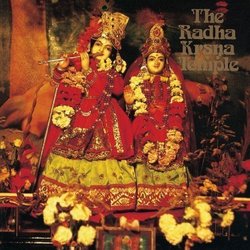Blissful Sounds for Krsna Bhaktas... Impenetrable to Others
David Eniz | lombard, il United States | 08/11/2002
(4 out of 5 stars)
"I first heard this LP, produced by George Harrison and released in 1969, in 1990 when I was a teenager who had just discovered Hare Krishna and was utterly starved for anything geared toward a Krishna devotional (bhakti/bhakta) experience. These are ancient Hindu chants, presented in a somewhat modern style, sung with varying degrees of success not by an Indian guru, but by converted westerners. There is a soft spot in my heart for this album, which was created with obvious sincerity and love, but objectively speaking, some of the voices on the album take a lot of getting used to. Some of the call-and-response numbers feature a guy in the background who is singing with such gusto that he sounds like he's about to soil himself, and in doing so throws such things as "pitch" and "tone" to the wind. And some of the singers just don't sound all that comfortable with Sanskrit. As far as the overall musical presentation goes, a portion of the record is gussied up with string sections, slide guitar, and 60's rock accompaniment. The remainder of the record consists of bare-bones harmonium drones floating atop thudding hand-drums and jangling finger-cymbals, acoompanying vocalists of sincere intent but questionable ability.
Bottom line: If you're looking for "authentic Indian devotional music," this isn't it. If you're looking for a thoroughly modern musical experience, this isn't it. But if you simply want to wade into Krishna-conscious music, it really is quite lovely in its way."
The All-Attractive Krishna
Yamuna Charya | Kentucky, USA | 06/26/2004
(5 out of 5 stars)
"Listen to this CD is an incredible experience to me. The first time I heard this CD was in China, I began to search for it, wanting to know the name of the first song, and how to sing it. English is my second language so it was hard for me to catch the lyrics. At the time I didn't know George Harrison's contribution to this CD, but I enjoy it.The first song, "Govinda", is so mysterious that every time I listen to it I nearly couldn't hold my tears. Later on I found the other songs in this CD are also.....incredible. It seems they convey unlimited message. I can't tell if the hymns are authentic Indian style because I don't have any Indian CD/tape. Today probably is the 10th year I listen to this CD and I still find it young. Listen and see if you can find the treasure in it."
Hare Krishna Explosion
Mike B. | 04/02/2008
(5 out of 5 stars)
"Hare Krishna
Hare Krishna
Krishna Krishna
Hare Hare
Hare Rama
Hare Rama
Rama Rama
Hare Hare
In 1966 Swami Prabhupada brought this mantra from India to New York City. It was soon heard around the world. This album played a big part in helping to create the "Hare Krishna explosion", largely due to the efforts of George Harrison. Anything connected to The Beatles was eagerly investigated by young people in every country. George produced this album, and it was released on The Beatles own Apple Records label. He also played guitar on some of the tracks.
Harrison's spiritual pursuits began when his band - along with Donovan, Mike Love of The Beach Boys, and Mia Farrow and her sister Prudence - all took a trip together to India in early 1968. They stayed for a while in the ashram of the guru Maharishi Mahesh Yogi. A year later George and John met Swami Prabhupada, and George offered to help the elderly swami. He helped finance the printing of his "Krishna Books", and even wrote a foreword for them. He also financed a temple in London called The Bhaktivedanta Manor. But it was this record that really "got the word out".
People of a certain age remember when this was just about the only record of its kind. It was certainly the most prominent. If you practiced yoga in 1971 (when this album came out) - it was inevitably playing in the background. The record contained songs Apple previously issued as singles, and which were big hits in England and parts of Europe. "Hare Krishna Mantra" (1969) and "Govinda" (1970) had resulted in the Hare Krishnas appearing and singing on the British television show "Top Of The Pops".
At the same time The Beatles were in India, the rock musical "Hair" was a sensation in New York, and the Hare Krishna mantra was sung on the best-selling cast album. After Apple's two singles and the eventual release of "Radha Krishna Temple", there weren't many people who didn't know "Hare Krishna". New temples opened globally at a rapid pace, and their "devotees" could be seen singing the mantra on street corners in every major city.
Harrison would advance the cause further with his album "All Things Must Pass" (1970). His world-wide number one hit from this record ("My Sweet Lord") contained part of the mantra. Other songs also mentioned or alluded to Krishna. He continued this on his next studio album "Living In The Material World" (1973). Indeed, he remained committed to the teachings of Swami Prabhupada right up to his (Harrison's) untimely death.
The songs on "Radha Krishna Temple" are sung in Sanskrit. For many years I thought it was a man singing, but it turned out to be a woman with a deep, sonorous voice. She sings some songs solo with spare accompaniment, while others are given the full treatment of banging drums, finger cymbals, and enthusiastic backing vocals by other devotees. Every song has someone playing harmonium - a truly otherworldly, hypnotic, and mysterious-sounding keyboard.
This is a very beautiful CD in some sections, and a rousing joy in others. Highly recommended."

